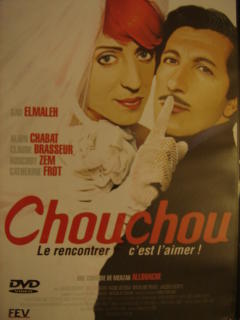
Foe viewers used to Hollywood ways of thinking, every French film reserves a huge surprise. It wouldn't be hard to guess the endings of American mainstream movies, but French reverse all the values taken for granted and liberate the audience's conventional ideas of love, dreams, courage...
The film "Chouchou" is about a north African seeking for his cross-dressing nephew in Paris. He passes for a Chilian to win sympathy from the father of a suburban church, thus a bed. With the priest and brother Jean starts his life in Paris. Gradually it is revealed to the audience that he dreams to be a woman, at least dressed like one. The father introduces him to work for a shrink to whom Chouchou confesses his secret. The doctor encourages him and gives him permission to dress as a woman in the clinic. Then starts his double-faced life, man before and after work and woman at work. Afterwards, he is reunited with his nephew who works as a cross-dresser in a nightclub. While waitressing there, Chouchou runs into a man that just ADORES him as a woman and falls in love with him. In one confession, Chouchou tells the father why he desires so much to be a woman and the father is utterly moved by his story.
In the meanwhile, there is a problem in the clinic. A man who claims to be the police is eager to hunt down Chouchou because the latter angers him while he seeks for a session with the doctor. In one scene, in order to save the shrink, Chouchou throws the vase at the man, which only worsens the man's hate for him. Not to involve the father and brother Jean, Chouchou moves into his nephew's apartment. He worries and misses his man at the same time, but at the end, he decides to go to the police and settles the problem once for all, only to find that the man is a lunatic. The ending is a merry one because Chouchou has a wonderful wedding with all his friends' blessing.
I have not seen enough French films to suggest that there is a formula in French styles of fairy-tales, but it was difficult not to be surprised that many cultural/social phenomena are taken for granted. For example, encouraging a man to be a cross-dresser or a woman is the last thing one will find in many cultures, not even in comedies. Besides, it's even more amazing that one man accept another man so easily without any problem of gender issues, without caring about what others might say. Most of all, it seems that the whole society is open-minded enough to view a man as a woman only because he considers himself as one. Little by little the audience can't but take it all. What is thought of as taboos is displayed openly on screen. This film might be a naive comedy, but it focuses on what is beyond the superficial differences. Maybe my viewpoint is nothing but a naive interpretation, but what matters more than when a man finds the best way to present himself with confidence and what is more important than love and dreams? Genders and social prejudice can't stand in the way. I call this the French fairy-tale. There might not be a beautiful woman and a handsome man, but the seemingly ridiculous story might be closer to the reality than the prototype of Hollywood fairy-tales.


No comments:
Post a Comment